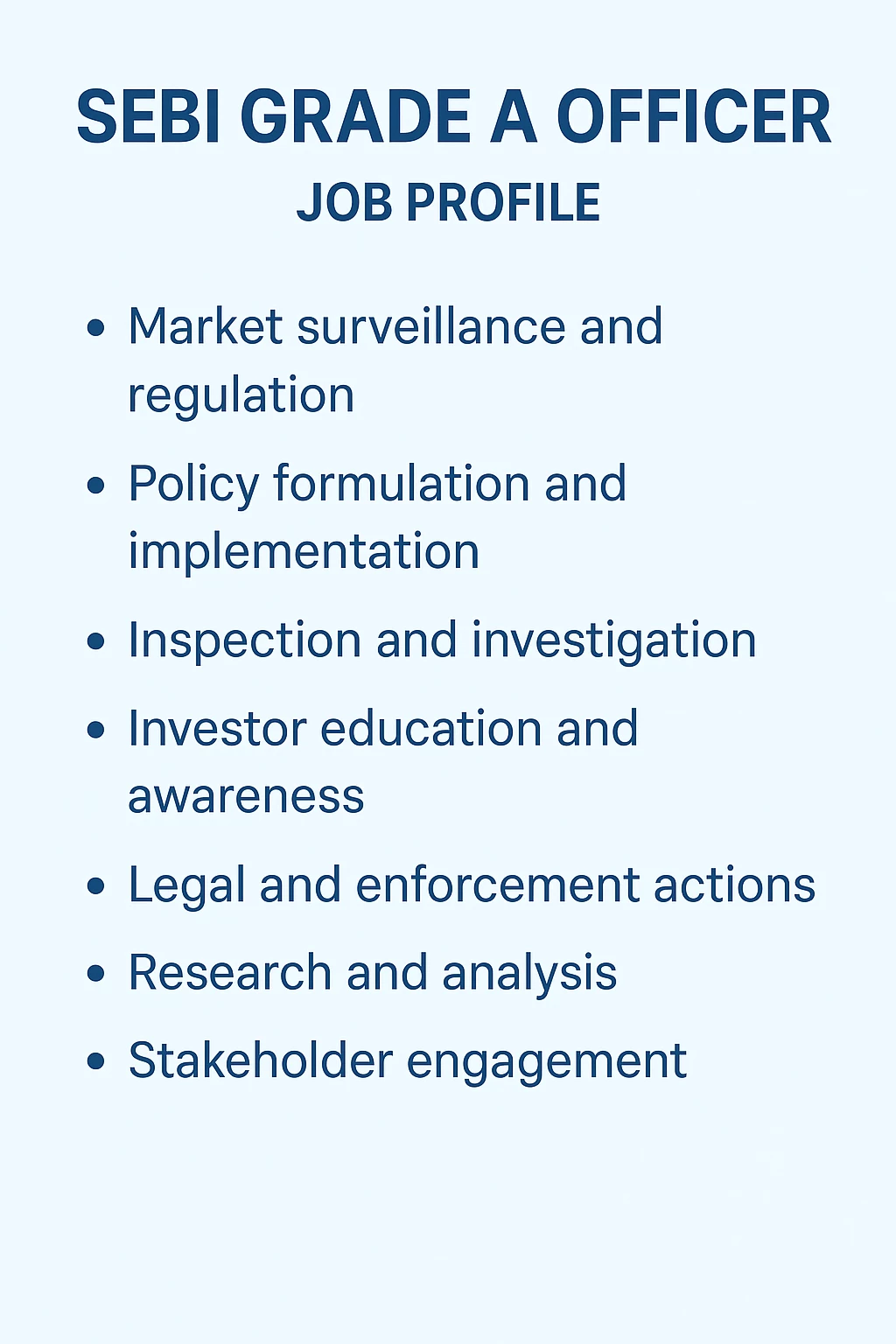Who is a SEBI Grade A Officer?
A Grade A officer at the Securities and Exchange Board of India (SEBI) is a starting management job. This role is important for keeping an eye on India's stock market. You'll handle rules, help create policies, and watch the market, which all work to keep the money business honest and helps it grow.

Main Responsibilities and Duties
SEBI Grade A officers have different duties based on their department. Here’s a look at what they mainly do:
1. Watching and Controlling the Market
- They watch trading to find and stop market cheating, insider trading, and other bad actions.
- They make sure stock exchanges, brokers, and mutual funds follow SEBI rules.
2. Creating and Putting Policies in Place
- They help create and check policies to make the market clear and protect investors.
- They put new rules in place and make sure they are followed in the market.
3. Checking and Investigating
- They check stock exchanges and other market groups to see if they follow SEBI rules.
- They look into complaints and rule breaks, and fix things as needed.
4. Teaching and Informing Investors
- They hold seminars, workshops, and campaigns to teach investors about their rights and duties.
- They create and share materials to help the public understand the securities market.
5. Legal and Enforcement Actions
- They write legal papers and take part in actions to handle rule breaks.
- They work with legal experts to make sure rules are enforced well.
6. Research and Analysis
- They do research on market trends, economic signs, and rule effects to help make policy choices.
- They study data to find possible risks and chances in the market.
7. Working with Stakeholders
- They work with market groups, industry groups, and government bodies to work together and get feedback.
- They speak for SEBI in meetings with groups in the country and around the world.
Check your exclusive guide on How to Become Investment Banker After 12th in India?
Departmental Assignments
Upon joining, SEBI Grade A officers are assigned to various departments based on their stream of recruitment and organizational needs. Common departments include:
- Market Intermediaries Regulation and Supervision Department (MIRSD)
- Investment Management Department (IMD)
- Department of Economic and Policy Analysis (DEPA)
- Legal Affairs Department
- Corporate Finance Department
Each department focuses on specific aspects of market regulation, offering officers specialized experience and expertise.
Explore: Investment Banker Salary in India 2025.
Job Postings and Transfers
The posting location and other details are bulleted below:
- Starting Out: Most people start their work with SEBI at the main office in Mumbai.
- How Transfers Work: Usually, people are moved to a new job after working in the same role for five years.
- Switching Departments: To get more experience, employees might be moved to varied departments.
- Work in Rural Areas: SEBI offices are all in cities, so there are no jobs in rural places.
Find out why SEBI Grade A Officer is amongst the Top 10 Highest Paying Government Jobs in India.
Career Progression/Promotions
SEBI offers a structured career progression for Grade A officers, with promotions based on performance and experience. The typical hierarchy is as follows:
Grade | Position | Minimum Service Requirement |
A | Assistant Manager | Entry-level |
B | Manager | 3–5 years |
C | Assistant General Manager | 3–5 years |
D | Deputy General Manager | 3–5 years |
E | General Manager | Based on performance |
F | Chief General Manager | Based on performance |
G | Executive Director | Appointed by Government |
Promotions up to Grade F are non-vacancy based, while those beyond require vacancies to be available.
Work Environment and Culture
- Work Hours: SEBI offices generally follow regular business hours, though there may be times when longer hours are needed.
- Work-Life Balance: This position provides a good work-life balance, as employees have weekends and public holidays off.
- Office Culture: SEBI encourages a professional, team-oriented atmosphere where ongoing learning and growth are valued.
Insightful Read: General Manager Salary Per Month in India – Monthly Pay, Perks & Job Profile
Pay and Perks
SEBI provides Grade A officers with a good salary and benefits.
- Starting Basic Pay: ₹62,500 each month.
- Total Monthly Salary: About ₹1,84,000.
- Yearly Salary: Approximately ₹22–24 lakhs.
Read: SBI Bank Manager Salary 2025: Average Salary, Growth Possibility and Additional Pay
Other Perks
- Housing Allowance
- Medical Coverage
- Leave Travel Help
- Travel Expense Coverage
- Insurance and Retirement Benefits
- Reduced-Price Lunch
- Money for Books and a Briefcase
- Computer Purchase Plan
- Assistance for Getting Job-Related Training
These benefits make up a complete and appealing pay package for SEBI Grade A officers.
If you want detailed insights on SEBI Grade A Salary 2025, Pay Scale, In-Hand Salary, Allowance Breakdown & Career Pathway , please check that.
Global Prospects
Even though SEBI doesn't have offices in other countries, the skills Grade A officers gain can lead to jobs abroad:
- Global Financial Groups: Groups such as the World Bank and IMF appreciate knowledge in financial rules.
- Regulatory Agencies in Other Countries: SEBI experience can help in getting jobs with other countries' regulatory groups.
How to Become a SEBI Grade A Officer in India?
Here is a 10-step guide to becoming a SEBI Grade A Officer in India:
Step 1: Know the Role
Before you start preparing, it is important to understand what a SEBI Grade A Officer does. They:
- Regulate India's securities markets.
- Protect investors and ensure compliance with SEBI rules.
- Work in departments such as legal, economic, research, IT, and enforcement.
- Handle monitoring, inspections, policy creation, and investigations.
Understanding the job helps you prepare for both exams and interviews with clarity.
Step 2: Make Sure you are Eligible
Eligibility varies slightly depending on the stream (General, Legal, IT, Engineering, etc.):
Criteria | Requirement |
Educational Qualification | Minimum: Bachelor’s degree in any discipline for General stream. Specific streams (Legal, IT, Engineering, Research) require respective degrees. |
Age Limit | 21–30 years for general category (relaxation for reserved categories). |
Nationality | Indian citizen. |
Tip: Always check the latest SEBI notification for specific eligibility.
Step 3: Be Aware of the Selection Process
SEBI Grade A recruitment is through a 3-stage selection process:
- Phase I – Online Screening Exam (Objective type, general awareness, finance, reasoning, English).
- Phase II – Main Exam (Objective + Descriptive/MCQ depending on the stream).
- Phase III – Personal Interview (Tests domain knowledge, analytical skills, and personality).
Step 4: Build Familiarity with the Syllabus
Familiarize yourself with the detailed syllabus for Phase I and II exams:
Phase I:
- General Awareness
- Quantitative Aptitude
- Reasoning Ability
- English Language
Phase II (stream-specific):
- Finance and Economics for General/Finance stream
- Law for Legal stream
- IT and Computer knowledge for IT stream
- Engineering and Technical knowledge for Engineering stream
Tip: Download official syllabus from SEBI website to avoid missing topics.
Step 5: Create a Study Plan
A structured study plan is essential:
- Divide your preparation into daily, weekly, and monthly goals.
- Allocate more time to weaker subjects.
- Include current affairs and market updates daily.
- Reserve last 2 months for revision and mock tests.
Tip: Consistency is more important than intensity.
Step 6: Prepare Study Material
Use standard books and online resources:
Subject | Recommended Material |
General Awareness | Newspapers (The Hindu, Economic Times), Monthly GK magazines |
Quantitative Aptitude | R.S. Agarwal, Arun Sharma |
Reasoning | R.S. Agarwal, MK Pandey |
English | Wren & Martin, Word Power by Norman Lewis |
Finance/Economics | SEBI Publications, NCERT, Indian Economy by Ramesh Singh |
Law | Bare Acts, N.L. Mitra, Relevant Journals |
IT | Standard IT books and online tutorials |
Tip: Focus on SEBI-specific regulations and market developments.
Step 7: Practice Mock Tests
- Solve previous year papers of SEBI Grade A.
- Take timed mock tests for both Phase I and II.
- Analyze mistakes and work on weak areas.
- Improve speed and accuracy for objective papers.
Tip: Online mock tests are useful to simulate real exam conditions.
Step 8: Stay Updated with Current Affairs
- SEBI exams heavily focus on current events, especially finance and economics.
- Read financial newspapers and SEBI notifications daily.
- Make notes for revision: RBI updates, SEBI regulations, IPO news, market reforms.
Tip: Last 2 months should be for revising these notes daily.
Step 9: Prepare for the Interview
Phase III is the interview/personal assessment, so preparation is crucial:
- Be thorough with your academic subjects and work experience (if any).
- Prepare to answer questions on SEBI, financial regulations, and current affairs.
- Practice common HR questions (strengths, weaknesses, future goals).
- Mock interviews with peers or mentors improve confidence.
Tip: Maintain professional appearance and body language during the interview.
Important: Self Introduction in English for Students, Sample and Tips for Interview in 2025
Step 10: Apply and Follow Notifications
- Keep checking the official SEBI website for notifications.
- Fill the application carefully and pay the required fees.
- Follow deadlines strictly for Phase I, Phase II, and interview call letters.
- After results, track updates for joining instructions and training.
Tip: Only apply through official SEBI channels to avoid scams.
Conclusion
Becoming a SEBI Grade A Officer requires clarity of the role, proper eligibility, rigorous preparation, and constant awareness of the financial world. Consistency, mock practice, and keeping updated with regulations significantly improve your chances.
In summary, the SEBI Grade A officer job is a respected and satisfying career in India's money world. With a clear career path, good pay, and chances to grow professionally, it’s a great option for those who care about financial rules and honest markets.
Refer job profiles and salary of these important posts.
- Indian Statistical Service (ISS)
- Indian Economic Service Salary 2025: How Much Do Indian Economic Service Officers Earn Per Month in India?
- RBI Grade B Salary in Detail
- How to Become RBI Governor in India: Eligibility, Steps & RBI Officer Pathway 2025.
- RBI Governor Salary Per Month in India in 2025: In-hand Salary, Perks and Benefits.
- RBI Probationary Officer (Grade B) Salary 2025: In-Hand Pay, Allowances & Benefits
- RBI Jobs After Graduation: Top Posts, Eligibility, Salary & How to Apply
- RBI Assistant Salary in 2025: Revised Pay Structure, Benefits and Allowances

